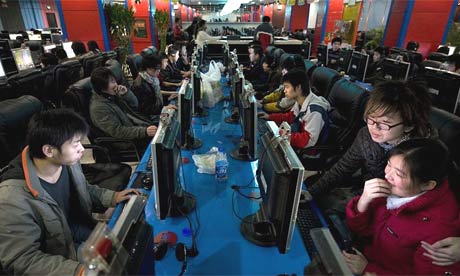
Chinese internet users have reacted with fury after Microsoft launched an anti-piracy tool to combat the widespread sale of fake software.
People have flooded blogs and bulletin boards to complain it violates their right to privacy - with one lawyer even reporting the firm to security officials for "hacking".
Microsoft dominates the Chinese market and even the president, Hu Jintao, has said he uses its products. But with software piracy as a whole said to stand at over 90%, the firm's profits fail to reflect its popularity.
The new version of its Windows Genuine Advantage anti-piracy programme turns the on-screen background black every hour if the installed software fails a validation test. Previous versions simply notified users their product was counterfeit.
But the software giant's attempt to protect its intellectual property sparked angry denunciations.
"The computer is mine!" one angry blogger wrote on the popular Chinese web portal Sina.com. "Microsoft has no right to control my hardware without my agreement."
Dong Zhengwei, 35, a Beijing lawyer, has complained to the public security ministry, describing the software giant as the "biggest hacker in China, with its intrusion into users' computer systems without their agreement or any judicial authority".
He told the official China Daily newspaper that he believed the measure breached China's criminal law, adding: "I respect the right of Microsoft to protect its intellectual property, but it is taking on the wrong target with wrong measures. They should target producers and sellers of fake software, not users."
The China Software Industry Association said it also planned to take action against Microsoft, with director Chen Chong telling China Daily that the measure was "very bad".
Critics said Microsoft was putting their information at risk by accessing their computers.
Microsoft says that it collects minimal information. It argues that counterfeit software poses a far greater risk to information security and says that it is helping users who may not be aware that they are using a fake product - and who risk problems such as data corruption or even identity theft.
Yesterday the company claimed that software piracy was costing the United States tens of thousands of jobs and billions of dollars.
(Guardian)
 Total Members: 14197
Total Members: 14197 Latest: Levine
Latest: Levine Total Posts: 43431
Total Posts: 43431 Total Topics: 16526
Total Topics: 16526 Online today: 2972
Online today: 2972 Online ever: 51419
Online ever: 51419 Total Members: 14197
Total Members: 14197 Latest: Levine
Latest: Levine Total Posts: 43431
Total Posts: 43431 Total Topics: 16526
Total Topics: 16526 Online today: 2972
Online today: 2972 Online ever: 51419
Online ever: 51419